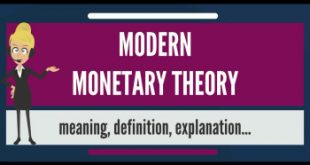[embedded content]
Read More »Interview mit Stephanie Kelton
Interview mit Stephanie Kelton Kelton: Die Vorstellung, dass Staaten nur eine begrenzte Menge an Geld zur Verfügung hätten, kommt aus einer Zeit, in der die Währung in den meisten Ländern in der einen oder anderen Form an Edelmetalle wie Gold oder Silber gekoppelt war. Heute ist das nicht mehr so. Geld wird einfach gedruckt – genauer gesagt: im Computer erzeugt. Es lässt sich beliebig vermehren. ZEIT: Das klingt jetzt so, als würden Sie einem Kind sagen:...
Read More »Thomas Palley claims MMT fails to provide plausible macroeconomics
Thomas Palley claims MMT fails to provide plausible macroeconomics Modern Money Theory (MMT) asserts society can enjoy a range of large government programs for free via money financed deficits, all without inflation … Recently, progressive Democrats have called for a range of programs … All of them can reasonably be argued for. However, there is also the question of how they will be financed. Proponents of MMT assert that is a non-problem and the programs...
Read More »John Maynard Keynes — an introduction
John Maynard Keynes — an introduction [embedded content]
Read More »Bab’Aziz
[embedded content]
Read More »Poem of the atoms
Poem of the atoms [embedded content]
Read More »Debunking the balanced budget superstition
Debunking the balanced budget superstition [embedded content] I think there is an element of truth in the view that the superstition that the budget must be balanced at all times [is necessary]. Once it is debunked, [it] takes away one of the bulwarks that every society must have against expenditure out of control. There must be discipline in the allocation of resources or you will have anarchistic chaos and inefficiency. And one of the functions of old...
Read More »Richard Wolff on what MMT has taught us
Richard Wolff on what MMT has taught us [embedded content]
Read More »Inflation targeting — the wrong tool for the wrong purpose
Inflation targeting — the wrong tool for the wrong purpose [embedded content]
Read More »MMT — vad är det?
MMT — vad är det? Överskottsmålet är ett hål i huvudet. Riksbanken kommer inte att nå sitt inflationsmål. Euron är dysfunktionell och eurokrisen kommer tillbaka vid nästa recession. Se där tre bra utgångspunkter för den som vill förstå hur ekonomin kommer att utvecklas det närmaste året. Låter det både stolligt, alarmistiskt och populistiskt? Möjligt, men det finns en röd tråd i dessa utsagor. De bygger på de insikter som vuxit fram i det som kallas Modern...
Read More » Lars P. Syll
Lars P. Syll




